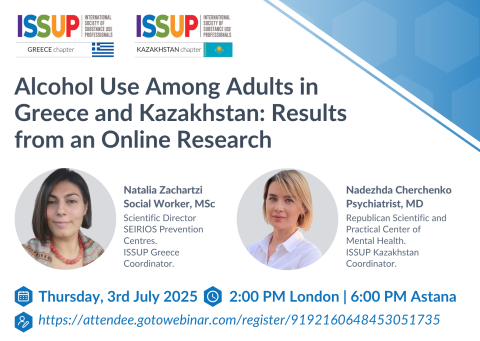City/Region/State or Online
Online
Speaker
Natalia Zachartzi
Nadezhda Cherchenko

ISSUP Greece and ISSUP Kazakhstan cordially invite you to a presentation of the results from an online study on alcohol use among adults in Greece and Kazakhstan.
Date: 3rd July 2025
Time: 2:00 PM London | 4:00 PM EEST | 6:00 PM Astana
Register for the Webinar
This webinar will present the results of an online survey on alcohol use among adults in Greece and Kazakhstan. It will highlight key findings from each country and briefly discuss how the data can support the planning of prevention efforts. The session will also touch on recent trends in alcohol use and the importance of local research in addressing public health challenges.
Intended Audience:
-
Addiction professionals
-
Prevention specialists
-
Mental health and public health practitioners
-
Social workers and counsellors
-
Researchers and academics in substance use fields
-
Policy makers and program planners
-
Students and trainees in health and social sciences
Learning outcomes:
By the end of the webinar, participants will:
-
Learn about recent data on alcohol use in Greece and Kazakhstan based on an online survey.
-
Understand the extent of alcohol use and how the findings can support preventive interventions.
-
Recognise the value of local research in shaping effective prevention strategies.
Presenters:
Nadezhda Cherchenko
Psychiatrist, MD,
Republican Scientific and Practical Center of Mental Health
Coordinator ISSUP Kazakhstan
Natalia Zachartzi
Social Worker, MSc
Scientific Director SEIRIOS Prevention Centres.
ISSUP Greece Coordinator.
Webinars and online events delivered and hosted by the International Society of Substance Use Professionals (ISSUP) are provided for informational purposes only. They are educational in nature and do not constitute medical advice, diagnosis or treatment.
